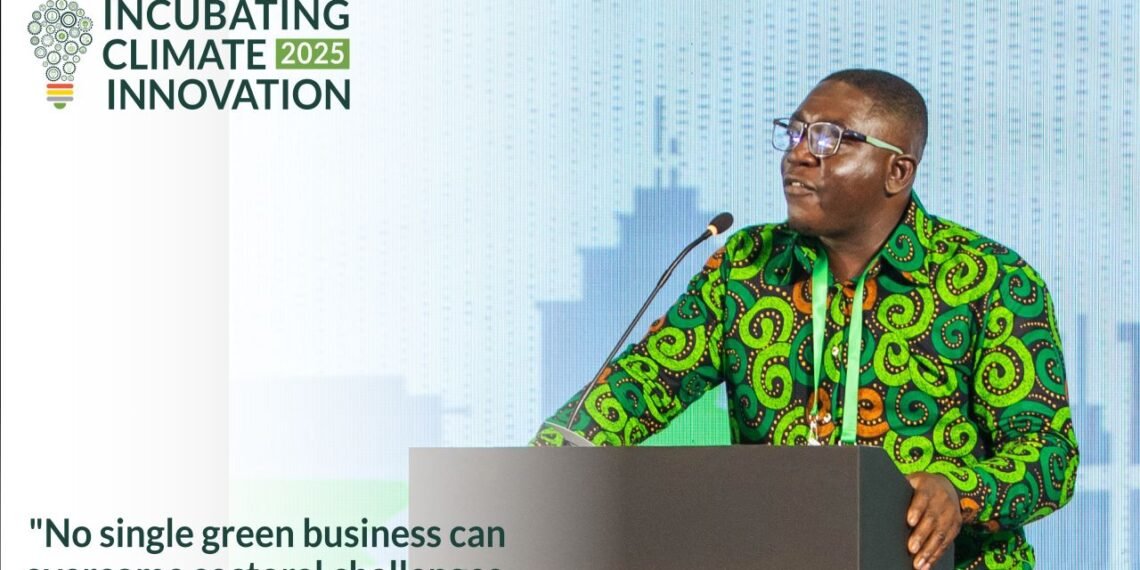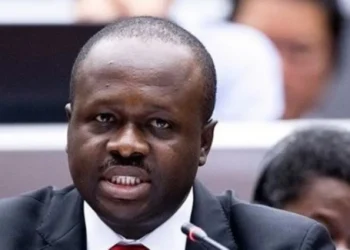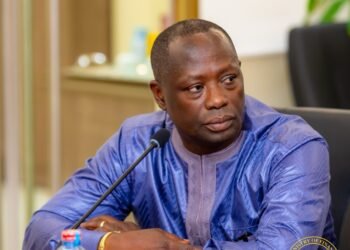At the 7th Incubating Climate Innovation Forum hosted by the Ghana Climate Innovation Centre (GCIC), policy think tank IMANI Africa delivered a strong call for deeper collaboration, bold policy reform, and inclusive financing to accelerate the scale-up of green Micro, Small, and Medium Enterprises (MSMEs) in Ghana.
Speaking at the well-attended event, Dannis Asare, a Senior Researcher at IMANI, praised GCIC’s leadership in nurturing sustainable businesses and underlined the urgent need for systemic shifts in Ghana’s green economic environment.
“The GCIC continues to empower Ghanaian green enterprises to believe that they are not just businesses, but active players in Ghana’s green transformation.
“But this year’s theme is timely—it reflects a triple challenge: worsening climate vulnerability, scalability constraints, and chronic underinvestment in climate-resilient solutions.”
Dannis Asare, a Senior Researcher at IMANI
Asare presented sobering statistics to demonstrate the financial toll of climate change on Ghana’s economy. Citing IMF data, he noted that recent droughts in the northern regions wiped out nearly 10% of agricultural production, affecting over a million farmers.
“The World Bank estimates these losses at 0.7% to 1.5% of Ghana’s GDP—more than the nation’s entire midyear expenditure on goods and services in 2024.
“We needed more than GHS 8 billion to close the gap and support affected farmers. That’s the fiscal cost of environmental mismanagement.”
Dannis Asare, a Senior Researcher at IMANI

The challenge is compounded by declining clean energy investment in Africa. According to the World Energy Investment 2025 Report, such investments have shrunk by nearly a third in the last decade.
Despite these headwinds, green businesses are proliferating. According to Ghana Statistical Service data cited by Asare, 20% of Ghana’s 1.9 million business establishments—approximately 374,000—can be classified as green. However, nearly 70% of these are MSMEs, which struggle to scale.
“No single green business can overcome these systemic challenges alone.
“Scalability and impact can only be achieved through deliberate collaboration and partnerships among stakeholders in the green ecosystem.”
Dannis Asare, a Senior Researcher at IMANI
Asare emphasized that meaningful scale requires policy reform, targeted finance, and a culture of ecosystem-wide cooperation.
Fixing the Governance Bottlenecks

Central to Asare’s address was a critique of Ghana’s regulatory and policy framework, which he described as outdated and insufficiently aligned with green investment priorities.
“The current mix of policies, laws, and regulations does not sufficiently incentivize sustainable practices or create adequate demand for green products and services.”
Dannis Asare, a Senior Researcher at IMANI
He advocated for “conscious policy iteration” led by collaborative consultations with stakeholders to ensure regulations reflect the real needs of green entrepreneurs.
“The government must co-design incentives and mechanisms that actively shift consumer and business behavior toward sustainability.”
Dannis Asare, a Senior Researcher at IMANI
On the issue of financing, Asare pointed out that Ghana’s real private sector capital base grew by just 1.4% between 2014 and 2024—too slow to support the explosive growth potential of green MSMEs.
He called for the creation of a more innovative and responsive financing ecosystem, one that understands the unique business models of green enterprises and provides tailored funding instruments.
“Banks must evolve beyond traditional lending models.
“We need knowledge-sharing partnerships that connect financial institutions, investors, and entrepreneurs.”
Dannis Asare, a Senior Researcher at IMANI
This, Asare argued, will ensure better-designed financial products that meet the needs of businesses working in solar energy, waste recycling, sustainable agriculture, and water management.
Green Businesses Must Step Up

Turning to green entrepreneurs themselves, Asare urged them to build a more unified and vocal community to drive political accountability and public awareness.
“Policy reforms don’t happen in a vacuum. They come from consistent, coordinated engagement.
“When CSOs like IMANI call for dialogue, green businesses must show up. Your voice matters.”
Dannis Asare, a Senior Researcher at IMANI
He also encouraged businesses to form alliances, share infrastructure, and co-develop supply chains that enable efficiency and competitiveness.
“There are enormous opportunities in Ghana’s green economy. But working in silos will only limit your reach and impact.”
Dannis Asare, a Senior Researcher at IMANI
The forum highlighted both the resilience of Ghana’s green enterprises and the structural changes required for them to flourish. From policy bottlenecks and limited financing to climate vulnerability and low consumer awareness, the challenges are complex—but surmountable through collaboration.
As Asare aptly noted, “Collaboration, partnerships, and innovation are the surest pathways to building viable green enterprises that deliver economic prosperity and inclusivity.”
The GCIC forum brought together leaders from government, finance, business, and civil society—planting the seeds of an ecosystem-driven approach to climate entrepreneurship in Ghana.
READ ALSO: Mastercard and Access Bank Unveil Innovative Age-Segmented Card to Empower Ghana’s Youth



















